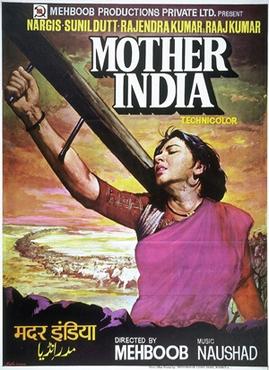
Mother India is a 1957 Indian epic drama film, directed by Mehboob Khan and starring Nargis, Sunil Dutt, Rajendra Kumar and Raaj Kumar. A remake of Khan's earlier film Aurat (1940), it is the story of a poverty-stricken village woman named Radha (Nargis), who in the absence of her husband, struggles to raise her sons and survive against a cunning money-lender amidst many troubles.

Nargis Dutt known mononyomusly as Nargis was an Indian actress and politician who worked in Hindi cinema. Regarded as one of the finest and greatest actresses in the history of Indian Cinema, she often portrayed sophisticated and independent women. Nargis' work was in a range of genres, from screwball comedy to literary drama, and earned her various accolades.
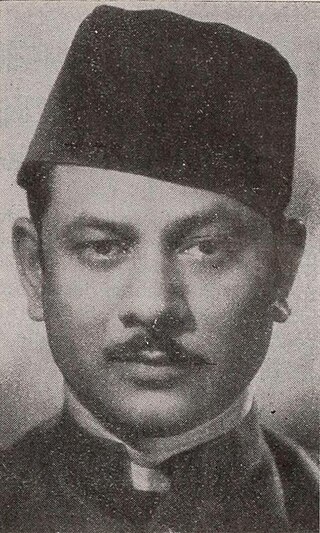
Mehboob Khan was a pioneer producer-director of Indian cinema, best known for directing the social epic Mother India (1957), which won the Filmfare Awards for Best Film and Best Director, two National Film Awards, and was a nominee for the Academy Award for Best Foreign Language Film. He set up his production company – Mehboob Productions, and later a film studio – Mehboob Studios in Bandra, Mumbai in 1954. He also created the dacoit film genre with Aurat (1940) and Mother India, and is also known for other blockbusters including the romantic drama Andaz (1949), the swashbuckling musical Aan (1951), and the melodrama Amar (1954).

Shamshad Begum was an Indian singer who was one of the first playback singers in the Hindi film industry. Notable for her distinctive voice and range, she sang over 6,000 songs in Hindustani, Bengali, Marathi, Gujarati, Tamil, and Punjabi languages, among which 1287 were Hindi film songs. She worked with renowned composers of the time, such as Naushad Ali and O. P. Nayyar, for whom she was one of their favorites. Her songs from the 1940s to the early 1970s remain popular and continue to be remixed.

Phir Hera Pheri is a 2006 Indian Hindi-language comedy film written and directed by Neeraj Vora. The film serves as the sequel to Hera Pheri (2000) and the second installment of the Hera Pheri franchise. The film stars an ensemble cast of Akshay Kumar, Suniel Shetty, Paresh Rawal, Bipasha Basu, Rimi Sen, Sharat Saxena, Johnny Lever, Rajpal Yadav, Milind Gunaji, Manoj Joshi and Razak Khan. Following the events of the previous film, a twist of fate changes the lives of Raju (Kumar), Shyam (Shetty) and Babu (Rawal) when they get cheated by a fraudster, Anuradha (Basu). They must now find another way to repay the money burrowed from a dreaded gangster, Tiwari (Saxena).

Motilal Rajvansh was an Indian actor and the winner of Filmfare Best Supporting Actor Award for Devdas (1955) and Parakh (1960). He is credited with being among Hindi cinema's first natural actors.
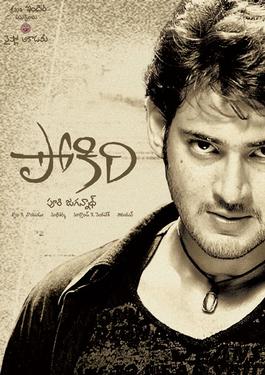
Pokiri (transl. Rogue) is a 2006 Indian Telugu-language action thriller film written and directed by Puri Jagannadh. The film was produced by Jagannadh and Manjula Ghattamaneni by their respective production companies Vaishno Academy and Indira Productions. The film stars Mahesh Babu, Ileana, Prakash Raj, Nassar, Ashish Vidyarthi and Sayaji Shinde. In the film, a local goon whose killer instincts earns him not only his girlfriend's disapproval and a corrupt cop's enmity, but also the attention of a wanted crime boss.

Andaz (transl. Style) is a 1949 Indian Hindi language romantic drama film, directed by Mehboob Khan, with music by Naushad. The film stars Dilip Kumar, Nargis, and Raj Kapoor in a love triangle, with Cukoo and Murad in supporting roles. The film's music was provided by Naushad and lyrics by Majrooh Sultanpuri. It is the only film to feature Dilip Kumar and Raj Kapoor together onscreen.
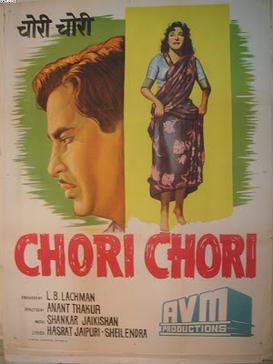
Chori Chori is a 1956 Indian Hindi-language romantic comedy film directed by Anant Thakur. It stars Raj Kapoor, Nargis in lead roles. Pran, Johnny Walker, Gope, David, Mukri, Bhagwan Dada have character parts. It is an adaptation of the 1934 American film It Happened One Night. This was the last film of Nargis and Kapoor together as leads, with Nargis doing one cameo appearance in the Kapoor starrer Jagte Raho (1956).

Anil Krishna Biswas, professionally known as Anil Biswas, was an Indian film music director and playback singer from 1935 to 1965, who apart from being one of pioneers of playback singing, is also credited for the first Indian orchestra of twelve pieces and introducing orchestral music and full-blooded choral effects, into Indian cinema. A master in western symphonic music was known for the Indian classical or folk elements, especially Baul and Bhatiyali in his music. Out of his over 90 films, most memorable were, Roti (1942), Kismet (1943), Anokha Pyar (1948), Tarana (1951), Waaris (1954), Pardesi (1957) and Char Dil Char Rahen (1959).
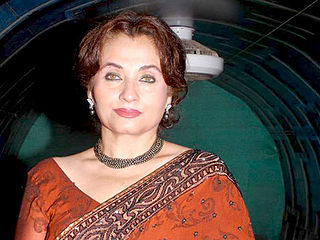
Salma Agha is a British singer and actress who worked in Pakistani and Indian films in the 1980s and the early 1990s.
Black Cat is a 2007 Indian Malayalam-language action thriller film written and directed by Vinayan and starring Suresh Gopi in the title role along with an ensemble supporting cast.
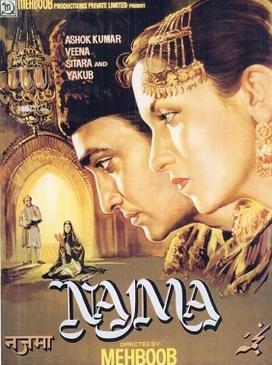
Najma is a 1943 Indian film directed by Mehboob Khan and starring Ashok Kumar and Veena. The film's music is by Rafiq Ghaznavi and lyrics by Anjum Pilibhiti.

Yeh Zindagi Hai is a Pakistani Urdu language comedy-drama television series that showed on Geo Entertainment from 2008 to 2013. It initially starred Javeria Saud, Saud Qasmi, Moammar Rana, Hina Dilpazeer, and Sana Fakhar. It became one of the longest-running television series in the history of Pakistani television, showing for six and a half years with more than 300 episodes. Yeh Zindagi Hai was hugely popular from its premier and made its leading actress, Javeria Saud, an overnight star.
Syed Mohiuddin Qadri Zore popularly known as Dr. Zore was an Indian writer, scholar, poet, literary critic, historian, and social reformer. He is best known for his pursuit of the rejuvenation of Urdu language and literature, writing 61 books in his lifetime, generating a major foundation of the Urdu literature now taught in all schools throughout India. Recognized as the first Urdu linguist, his writing ranged from short stories to novels to poetry, social commentary, scholarly criticism, and linguistic analysis. Along with his written legacy, one of his greatest contributions to revitalizing Urdu was his establishment of the organization Idare Adabiyaat-e-Urdu dedicated to the recovery, restoration, and digitalization of aging and disintegrating texts, books, and manuscripts, which are used in research of the ancient language. He also helped to found the Abdul Kalam Azad Oriental Research Institute, and a still-published Urdu magazine, known as Sabras.
Zeenat is a 1945 Indian Muslim social melodrama film directed by Syed Shaukat Hussain Rizvi and starring Noor Jehan, Yakub, Majid, Himalayawala, and Karan Dewan. It was produced by Shirazali Hakim and Ramzanali S. Lakhani. The film's story and dialogue was written by Wajahat Mirza Changezi. The music was composed by Meer Saheb and Hafiz Khan while the background music was provided by Rafiq Ghaznavi.

Kishwar Desai is an Indian author and columnist. Her first novel, Witness the Night, won the Costa Book Award in 2010 for Best First Novel and has been translated into over 25 languages. It was also shortlisted for the Author's Club First Novel Award and longlisted for the Man Asian Literary Prize. Her novel Origins of Love, published in June 2012, was critically acclaimed. The Sea of Innocence, published in 2014 in India as well as in the UK and Australia, was widely discussed as it dealt with the issue of gang rape. Desai also has a biography, Darlingji: The True Love Story of Nargis and Sunil Dutt, to her credit. She wrote her latest book in 2020, released on 28 December, titled, The Longest Kiss.
Khayyam Sarhadi was a Pakistani film and television actor and a radio personality.
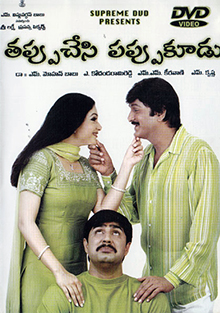
Tappu Chesi Pappu Koodu is a 2002 Indian Telugu-language comedy film written and directed by A. Kodandarami Reddy and produced by Mohan Babu under Sree Lakshmi Prasanna Pictures. The film stars Mohan Babu, Srikanth, Gracy Singh, Sujatha and Radhika Chaudhari. It is a remake of Priyadarshan's 2001 Malayalam film Kakkakuyil, which is in turn based on A Fish Called Wanda
Chakkar is a 2018 Pakistani television drama series written by Rukhsana Nigar that premiered on 12 December 2018 on Bol Entertainment, directed by Kanwal Khoosat. It stars Resham as a middle-aged girl who becomes bitter due to her stepmother and wants love and affection by marrying. Zain Afzal, Aamna Malick and Faryal Gohar played pivotal roles.















